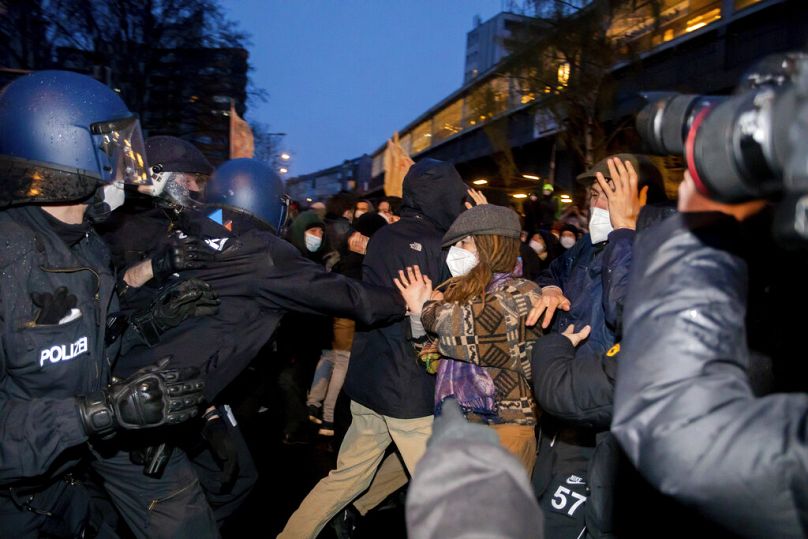EXPROPRIATE ENTEIGNEN
Berlin referendum: Voters mull one of Europe’s most radical ripostes to gentrification By Dave Braneck • Updated: 16/09/2021

A poster urging voters to gote 'Yes' on a referendum on housing due to be held the same day as Germany's federal election. - Copyright Euronews/ Dave Braneck
Germany’s looming federal elections, set to determine who will fill Angela Merkel’s over-sized shoes after her 16-year reign as chancellor, are dominating the global discussion about German politics.
But voters will be weighing in on much more than Merkel’s successor on Sunday. State elections in Berlin also fall on September 26, and a referendum that could send shockwaves throughout Europe is on the ballot.
Residents in the capital will decide if Berlin should expropriate so-called "mega-landlords". If so, the law will be one of Europe’s most radical responses to gentrification and the rising cost of housing, socialising roughly 240,000 apartments.
What's the background to Berlin’s referendum?
The referendum campaign, called Expropriate Deutsche Wohnen after one of Germany’s biggest property companies, is a reflection of growing frustration and helplessness among renters in the city.
Once known as one of the most affordable capitals on the continent, exploding rents have rendered Berlin a symbol of increasingly common urban struggles with housing costs.
Berlin has consistently registered some of the fastest-rising housing prices in the world in recent years. Though still relatively low compared to Europe’s other global cities like London or Paris, rents in Berlin have doubled in the decade between 2009 and 2019.
And while Berlin’s hip reputation and burgeoning tech sector have added a varnish of gloss to the city’s grit, wages remain low. Despite being the capital, Berlin is ranked 11th of Germany’s 16 states in per-capita income, below the country’s average.
According to Kalle Kunkel, an activist with the Expropriate Deutsche Wohnen campaign, housing costs don’t just put pressure on low-wage earners, they threaten to unweave the fabric of the city.
“The city’s low-wage earners, of which there are many, are already facing too high of a burden just to pay their rent. 80-85% of Berliners are renters, which means an overwhelming majority of the city has to face this social reality.
"And unlike other cities, Berlin isn’t particularly economically segregated. That people from different social brackets live among one another is a big part of this city’s identity, and what makes it so interesting.”
Though speculation in real estate has grown globally in recent years, the city of Berlin has significantly exacerbated the issue by selling off its public housing stock at a pittance after the fall of the Berlin Wall. Since 1990, Berlin has sold roughly 200,000 apartments to hedge funds and private equity firms.
Meanwhile, the city has grown significantly in the last decade, putting further pressure on the housing market.
“The city’s growth has outstripped the building of new apartments. There’s a real housing scarcity, which has helped make landlords incredibly powerful,” Kunkel told Euronews.
Finding a new apartment, regardless of the price range, is often a demoralising and gladiatorial experience. Renters frequently take whatever they can get, knowing they cannot afford to be picky.
Couple Simon and Georgina moved to Berlin four years ago, bouncing around between short-term sublets for a year before finding an apartment of their own.
“We moved in and thought, the rent is too high already but it’s the only place we could get,” Simon told Euronews. They were paying 900 euros a month without utilities for a two-bedroom apartment, knowing that neighbours in the same building on older contracts were paying significantly less.
This was likely due in part to a hasty renovation carried out in the apartment shortly before their arrival.
“Our place was renovated, but it was all done extremely quickly. Most stuff wasn’t even finished when we moved in, and when we’d write to the property management firm we’d never get a response,” said Georgina.
Reiner Wild, director of the Berlin Tenant’s Union (BMV), told Euronews that modernising apartments between tenants is a common tactic used by landlords to raise rents. According to Wild, raising rents between contracts has a major impact on the rental market.
“A significant majority of new rental agreements include a drastic price increase over former contracts, which means the process of new tenants coming into apartments helps to slowly erode the number of affordable apartments in the city… This also means renters are less likely to move out, as moving can be very costly. Which makes searching for a new apartment all the more difficult,” said Wild.

Aerial view of the Wilmersdorf district with office buildings and apartment houses close to the catholic St. Ludwig church in Berlin
Credit: AP
Berlin's failed attempt to freeze rents
Just as Berlin is demonstrative of runaway housing costs in many major cities, it’s taken a leading role in experimenting with far-reaching housing regulations.
The current referendum, pushed by the Expropriate Deutsche Wohnen campaign, is just the latest attempt in Berlin to reign in the housing market. It’s coming off the heels of the controversial overturning of Berlin’s rent cap in April.
The rent cap was introduced in February 2020 and froze rents in 90% of the city’s apartments for five years, while providing rent reductions for many residents. It was ruled unconstitutional because it was enacted on the state level and was deemed to override federal housing legislation.
Before the rent cap, tenants were typically left on their own to fight overcharges and illegal practices. Berlin already had a fairly robust set of renter protections aimed at curtailing rising rents, but struggles to enforce these rules. The rent-cap strengthened and automated this process.
Knowing their rent was significantly higher than it should have been when they moved in, Simon and Georgina pushed back. With the BMV’s support, they entered a year-long battle to lower their rent, which had been raised to an illegally high level between contracts. After the protracted spat ended in court, their rent was reduced by roughly 25%.
“When we first moved in, rent was about 50% of my income, so the reduction was really nice,” said Simon.
The rent reduction has also given them a level of financial independence they previously lacked. “It definitely was (a financial strain). Especially because as a couple we do things evenly. At the time I could afford it but it put pressure on me to stay in the job I was at the time because if I’d leave we couldn’t pay our rent,” said Georgina.
Berlin votes to freeze rent prices for five years
Berlin's rent cap is illegal, Germany's top court rules
Berlin starts controversial rent freeze on 1.5 million homes
'This is madness': Berliners face rent rises as pandemic's economic impact bites
Though they did get their rent reduced in the end, not everyone in the city can enter a protracted legal battle with their landlords to prevent illegal rent hikes. The rent cap provided blanket relief to the city and required landlords to comply immediately. That the cap was overturned in the midst of the pandemic has hit many Berlin residents particularly hard. Not only did rents go back up, but many renters also had to pay back the savings they accrued while the rent cap was enacted.
Though this moment was bitter for many renters and housing activists, it has served to provide momentum to what is a much more radical proposal: the campaign to expropriate the city’s mega-landlords.

Protesters confront police during a mass rally to protest against a court ruling removing a rent cap in Berlin, Germany, Thursday April 15
Credit: AP
What could Berlin's referendum change?
The campaign calls for any private landlord holding more than 3,000 apartments to be socialised and for the apartments to be converted into public housing, with the cost of buying the apartments back to be reimbursed over time by renters. Rent would go down, as the housing would no longer be focused on accruing profit.
The campaign officially launched in 2018, but according to activist Kalle Kunkel, the concept arose years before as various disparate tenants’ rights organisations considered how to most effectively combine their campaigns.
“(One of the organisations) made the point that we’ve actually already paid for these apartments 100 times over with our rent, why don’t we just take them back. Really, they belong to us.”
The idea stuck and has been gaining momentum ever since. 175,000 signatures are required to trigger a city-wide referendum, and the campaign nearly doubled that with 343,000.
Though many, particularly those in the real estate industry and politicians in the conservative CDU and liberal FDP opposition parties, have criticised the proposal, Kunkel takes their points in stride.
“We want to make the roughly 250,000 apartments currently in the hands of finance-focused actors affordable in the long term, so that people won’t get displaced. And a side effect of the campaign is that speculation in Berlin is seen as being dangerous. Which I think is a good thing,” said Kunkel.
In a written statement to Euronews, Deutsche Wohnen criticised the campaign, claiming it will fail to solve the challenges facing the Berlin housing market, and that, “expropriation in Berlin is impossible, as it is unconstitutional and financially unfeasible for Berlin’s residents.”
If the referendum passes, the biggest question will be its constitutionality. Though expropriation for the public good is explicitly allowed by the German constitution, whether expropriation on this scale fits that description will be up to Germany’s highest courts.
There is also a significant gap between projected costs for socialisation, with Expropriate Deutsche Wohnen calculating the project to cost roughly 8 billion euros, and the Berlin Senate estimating it to be closer to 30 billion.
According to Kunkel the exact costs will depend on whether or not the city pays market-rate prices for each apartment it socialises. Though expropriation law requires a ‘just’ reimbursement for anything being socialised, determining if that means market rates will be a political decision the city may have to face. Recent buybacks of private apartments have tended to be close to market value.
The Berlin-Brandenburg Association of Real Estate Companies (BBU), of which Deutsche Wohnen and other large landlords are members, has positioned itself against expropriation. Dr David Eberhart, the BBU’s spokesperson, told Euronews that the proposal was unlikely to be found constitutional and would be untenable to implement given Berlin’s struggles with existing regulatory enforcement.
Eberhart went on to say that, “Though it is completely understandable that people are worried about housing and rent in Berlin, we maintain that the only thing that can help this situation is the expansion of supply. And not just anything, but affordable rental apartments. But they need to be built.”
Though new apartments tend to be expensive in Berlin unless explicitly built as social housing. Rents in 85% of newly-built apartments in 2020 were significantly higher than social-housing levels.
Berlin residents are currently split nearly evenly on whether or not they think expropriation is the solution the city needs. In recent polling, the campaign held a slight lead, with 47% of responders supporting the initiative and 43% against it.
Campaign organisers know that even if the referendum passes, their work isn’t done. “The last word has yet to be spoken. The last step of the campaign will come after the election. We’ll have to keep up the pressure after what will hopefully be a positive result, to ensure that it's enacted politically by the city,” said Kunkel.
If it does go through, there will be serious challenges in implementation. Centre-left party SPD candidate for mayor Franziska Giffey recently spoke out against the initiative, which means crafting the explicit terms of expropriation would be a difficult, politicised process, which would then have to face judicial review and be found constitutional.
If the referendum doesn’t succeed, Berlin will have to once again go back to the drawing board and consider another means of solving its acute housing crisis, which will not go away on its own any time soon.
Every weekday, Uncovering Europe brings you a European story that goes beyond the headlines. Download the Euronews app to get a daily alert for this and other breaking news notifications. It's available on Apple and Android devices.
No comments:
Post a Comment